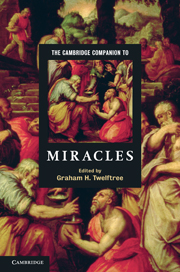17 - Patient belief in miraculous healing
positive or negative coping resource?
from Part IV - Miracle today
Published online by Cambridge University Press: 28 May 2011
Summary
Faith and hope in divine healing figure in most religious traditions. This chapter looks at faith in healing miracles and explores how following that faith may involve both risks and advantages. On the one hand, it may imply a risk by camouflaging a deferring attitude as when patients decline medical treatment on the basis of their belief in divine intervention, or demand utopian life-prolonging treatment so that God may be given time to perform a miracle. On the other hand, faith in miracles forms an important part of a well-integrated religiosity by inspiring hope and so helping patients to find meaning and initiative in situations in which they might otherwise be tempted to give up. Against the backdrop of such considerations, the chapter provides recommendations for health professionals and relatives on how to handle patient belief in miracles in practice.
FAITH IN DIVINE INTERVENTION AS A FUNDAMENTAL RELIGIOUS TENET
The majority of religious traditions profess faith in divine interventions such as miracles, signs, wonders or prophecies. All such traditions represent a fundamental belief that God can and does act in our world. Regardless of how different the suggestions may be as to how God has intervened and what he has achieved in doing so, religion is based on the idea that God can and has intervened in human affairs. If God had never intervened in this world in some way or another, people would not have had any knowledge of God, for people would have had no access to the realm of God. This is particularly true of the so-called Abrahamitic religions, that is, religions such as Judaism, Christianity or Islam, which believe in Abraham as their ancestor and that build on a foundational book.
- Type
- Chapter
- Information
- The Cambridge Companion to Miracles , pp. 309 - 329Publisher: Cambridge University PressPrint publication year: 2011



